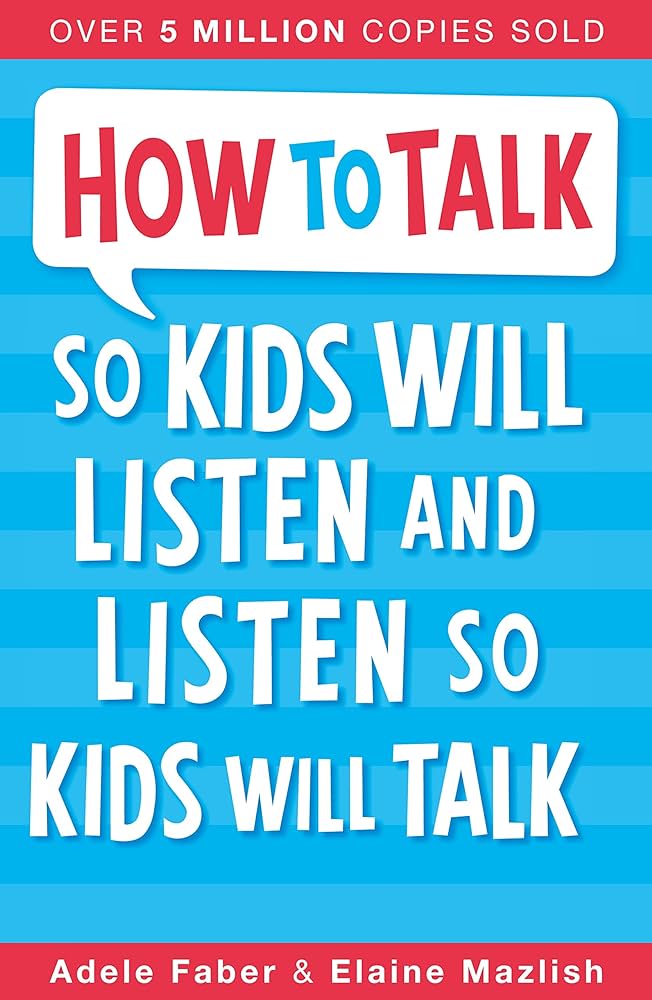
How to Talk So Kids Will Listen & Listen So Kids Will Talk
Author: Adele Faber Category: Self-Help Published: January 1, 1980 Language: English File Size: 9.53 MB Tags: Childrens | Communication | Education | family | Nonfiction | Parenting | Psychology | self help | Teaching |Theme:
How to Talk So Kids Will Listen & Listen So Kids Will Talk by Adele Faber, provides wonderful ideas on how to communicate with children whether you are a parent, teacher, or therapist
It is divided into sections about how to deal with children’s feelings, engaging cooperation, alternatives to punishment, encouraging autonomy, praise, freeing children from playing roles, and putting it all together.
Famous Quotes:
“I was a wonderful parent before I had children.”
“When we give children advice or instant solutions, we deprive them of the experience that comes from wrestling with their own problems.”
“The attitude behind your words is as important as the words themselves.”
“Children don’t need to have their feelings agreed with; they need to have them acknowledged.”
“The more you try to push a child’s unhappy feelings away, the more he becomes stuck in them. The more comfortable you can accept the bad feelings, the easier it is for kids to leg go of them.”
“Finally, are most of my moments with my child spent asking her to “do things?” Or am I taking out some time to be alone with her—just to “be together”?”
“Sometimes just having someone understand how much you want something makes reality easier to bear. So”
“I was a wonderful parent before I had children. I was an expert on why everyone else was having problems with theirs. Then I had three of my own.”
“It’s also not helpful when parents respond with more intensity than the child feels.”
“All we are given is possibilities— to make ourselves one thing or another. JOSÉ ORTEGA Y GASSET”
“Once upon a time there were two seven-year-old boys named Bruce and David. They both had mother s who loved them very much.
“One father said that what helped him become more sensitive to his son’s emotional needs was when he began to equate the boy’s bruised, unhappy feelings with physical bruises.”
“Does my request make sense in terms of my child’s age and ability? (Am I expecting an eight-year-old to have perfect table manners?)”
“Does he feel my request is unreasonable? (“Why does my mother bug me to wash behind my ears? Nobody looks there.”)”
“Can I give her a choice about when to do something, rather than insisting upon “right now.” (“Do you want to take your bath before your TV show or right after?”)”
“When we acknowledge a child’s feelings, we do him a great service. We put him in touch with his inner reality. And once he’s clear about that reality, he gathers the strength to begin to cope.”
“The time for empathy is when a child wants you to know how he feels.”
“Living with real children can be humbling.”
“Living with real children can be humbling. Every morning I would tell myself, “Today is going to be different,”
“Is there any way to explain the fact that sometimes my kids respond when I ask them to do something and sometimes I can’t seem to get through?”
“The problem for many parents is that their natural sense of fun fizzles out from the daily irritation of living with kids.”
“To learn a new language is not easy. For one thing, you will always speak with an accent. . . . But for your children it will be their native tongue!”
“One young man said that what he appreciated most about notes was that “they didn’t get any louder.”
“What people of all ages can use in a moment of distress is not agreement or disagreement; they need someone to recognize what it is they’re experiencing.”
“Somehow the image of a cut or a laceration helped him realize that his son required as prompt and serious attention for his hurt feelings as he would for a hurt knee.”
“The whole world will tell them what’s wrong with them—loud and often. Our job is to let our children know what’s right about them.”
Back
